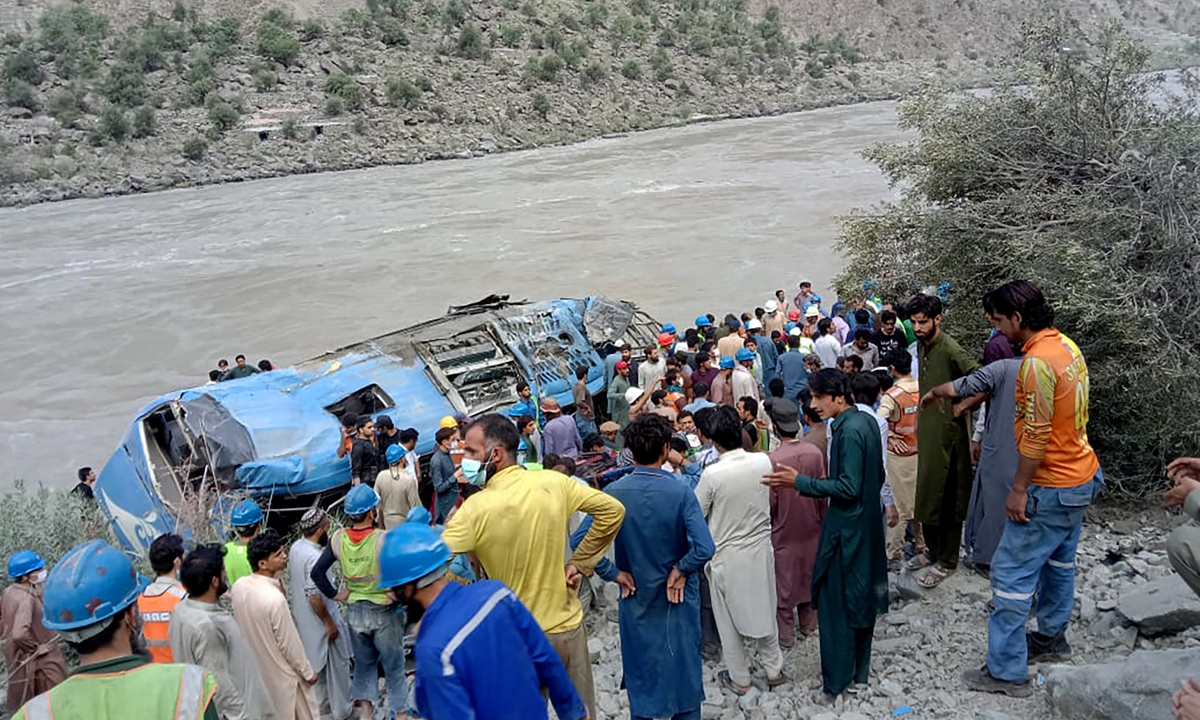Accident or terrorist attack? Speculations linger over bus blast in Pakistan
9 Chinese, 3 Pakistanis killed on way to China-invested dam project

Local residents and rescue workers gather at the site of a bus blast, in Kohistan district of northern Pakistan's Khyber Pakhtunkhwa province on Wednesday. Nine Chinese nationals and three Pakistani nationals were killed after their shuttle bus to China-invested Dasu hydropower project exploded and plunged into a ravine. Photo: VCG
Nine Chinese nationals and three Pakistani nationals were killed in a shuttle bus explosion in north Pakistan on Wednesday morning on their way to the China-invested Dasu hydropower project. Further investigations are urged as the reasons behind the incident remain unclear - whether it was an accident caused by mechanical failure or a bomb attack possibly plotted by terrorists.
Chinese experts said the investigation may need some time but they believed that the high level trust between the two countries will produce a truthful, reliable and convincing result.
The Pakistani Foreign Ministry announced on Wednesday afternoon that the bus carrying Chinese workers in Khyber Pakhunkhwa Province plunged into a ravine after a mechanical failure resulting in leakage of gas that caused the blast.
The ministry said Chinese workers and Pakistani staff were on their way to work at an ongoing project, and further investigations are under way.
The government and people of Pakistan extend their sincere condolences to the families of Chinese and Pakistani workers who lost their lives in the incident and pray for quick recovery of the injured, the ministry said.
Several hours earlier, the Chinese Embassy in Pakistan confirmed that the Chinese workers were on a bus heading to the Dasu Hydropower Project. The project is located in the Kohistan region in northern Pakistan and is being built by the China Gezhouba Group.
The Chinese embassy asked Pakistan to make an all-out rescue effort and treat the injured at all cost, strengthen security for Chinese institutions, projects and personnel, and find out the truth behind the incident as soon as possible.
The Chinese embassy condemned the attack, expressed its deep condolences to the victims and sympathy for the injured, and said it will do its best with Pakistan to properly deal with the aftermath.
The Global Times noticed that after the Pakistani Foreign Ministry issued the statement, an English statement sent by the Chinese embassy to the Global Times did not mention condemnation. The Global Times has learned that the incident is still under further investigation and verification.
Also hours earlier, Zhao Lijian, spokesperson of China's Ministry of Foreign Affairs, said at a Wednesday briefing that China is shocked and condemns the bombing attack in Khyber Pakhtunkhwa province. He added that China sends condolences to the Chinese, as well as Pakistani people who have been affected by the incident.
As a large-scale energy infrastructure project, the Dasu Hydropower Station has the advantages of low construction costs and large generating capacity.
The station generates about 12 billion kilowatt-hours of electricity annually, effectively filling Pakistan's current electricity gap. The project has also provided about 8,000 local jobs and helps build the local water supply, technical colleges and other public facilities in the area.
Attack or accident?
As a number of terrorist attacks were reportedly launched in the Khyber Pakhtunkhwa province - where the blast occurred - in recent years, analyses on whether the bus blast was a terrorist attack or mechanical failure remain divided. Chinese experts urged Pakistani side to find out the truth as soon as possible and release the results of further investigations.
Li Wei, an expert on national security and counter-terrorism at the China Institutes of Contemporary International Relations, told the Global Times on Wednesday that in his view, the explosion was more likely caused by mechanical failure. If it was a terrorist attack, there are three options: roadside bomb, motorbike suicide attack, or a human-carried bomb attack.
Li said that Chinese projects are well protected by the Pakistani army and police, and vehicles carrying Chinese employees are usually followed and led by Pakistani military vehicles, especially in sensitive regions such as Khyber Pakhtunkhwa province.
If it was a roadside bomb, Pakistani guard vehicles would have been the first target, Li said.
He added that if it was a motorcycle attack, it would have been easy to identify, as there would be a wrecked motorcycle on site. "Since there is no information on that, such a possibility could be ruled out," he said.
As for human-carried bombs, Li said that anyone who embarks on vehicles of China-Pakistan joint project will go through strict security checks. Moreover, a majority of the passengers are Chinese employees, so the chance for anyone carrying bombs on the bus is extremely low. Also, photos of the scene indicate otherwise.
Li said the bus in this accident looks outmoded, and may have gone out of control.
However, some Chinese experts questioned why the mechanical failure would trigger such a huge explosion and the area, where the blast occurred, borders Kashmir and is located on the upper Indian River characterized with high mountains and dangerous roads. Media reports said local terrorist organizations have frequently launched activities and it is difficult to eliminate them.
Long Xingchun, a senior research fellow at the Academy of Regional and Global Governance of the Beijing Foreign Studies University, said that if it was a terrorist attack, it may not necessarily target Chinese nationals. It could have been an attempt by terrorists to exert pressure on the Pakistani government and military.
Sharing similar speculations, Qian Feng, director of the research department at the National Strategy Institute at Tsinghua University, told the Global Times on Wednesday that he also tended to believe Balochistan terrorists and the Pakistani Taliban organization are possible sponsors of a bomb attack. Khyber Pakhtunkhwa province is the most restless region in Pakistan, as it borders Afghanistan and is home to the Pakistani Taliban, said the expert.
Qian said the group gained fame by attacking the Pakistani government, civilians and army. In recent years, the terrorist group has targeted Chinese projects in the country, and launched attacks on Chinese tourists, as well as businesspeople, as they know that Pakistan attaches great importance to China-Pakistan ties and aims to use those attacks to sabotage the relations, said Qian.
On April 21, a car bomb exploded in the parking lot of a luxury hotel in Quetta, the capital of Pakistan's Baluchistan Province, killing five people and injuring 12 others. No Chinese citizens were injured in the incident. The Pakistani Taliban organization later claimed responsibility for the attack.
The Pakistani Taliban's activities have been subdued with Pakistani government's continuous efforts in cracking down on terrorism, yet they have been on the rise recently, one possibility being the aftermath of the US withdrawal from Afghanistan, Qian said.
Wang Shida, deputy director of the South Asia, Southeast Asia and Oceania Research Institute of Contemporary International Relations Research Academy of China, pointed out that while the security situation in Pakistan has been improving and the number of violent attack has been decreasing, there has been an increasing trend of attacks against Chinese targets in the past two years.
In May 2017, two Chinese nationals were killed in southwestern Balochistan province, Pakistan, days after they were kidnapped by armed men pretending to be policemen from the city of Quetta.
This is mainly due to the smooth progress of the China-Pakistan Economic Corridor (CPEC), Wang explained. Some people inside and outside Pakistan do not want to see this and always attempt to create vicious incidents to delay the progress, Wang said.
Long said hydropower station is key project for any country, and something the Pakistani government desperately wants to protect. Normally, the Pakistani government makes sure those projects are well protected and he believes this time the army provided protection, and the accident happened suddenly before any reaction could be made.
The Pakistani army and police attach great importance to security of Chinese nationals and have set up special security units, Wang said, noting that in the past two to three years, there have been many attacks against Chinese targets without causing major casualties, which is due to the efforts of Pakistan.
The biggest concern is the impact of the deteriorating situation in neighboring Afghanistan: there are a large number of anti-Pakistan groups in Afghanistan, and if the situation deteriorates further, there may be more international and regional terrorist groups entering Pakistan, as well as hostile forces targeting Chinese nationals and the China-Pakistan Economic Corridor (CPEC), Wang said.
Long believes that after this incident, the Pakistani government will increase security around Chinese enterprises, as well as Chinese nationals as the destruction of the CPEC is the last thing they want to see.
"The incident will not sabotage China-Pakistan ties. China will stand firm beside the Pakistani government to crack down on terrorism, and support them to punish whoever is behind this attack," Long said.


